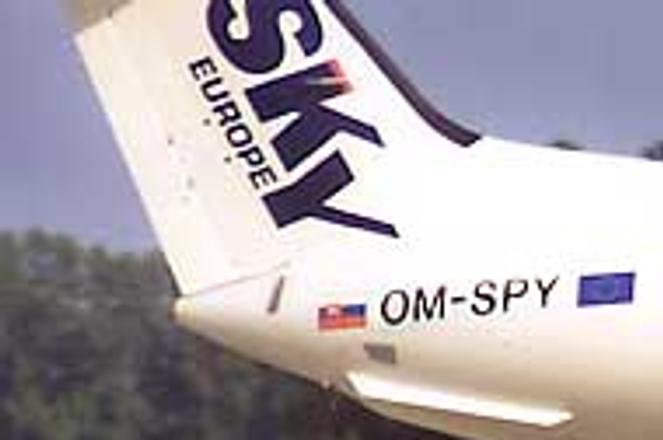SLOVAKIA's SkyEurope will add two more Embraer 120 aircraft to its fleet in the next six months.photo: Courtesy of SkyEurope
STARTING with a single 30-seat airplane on a shuttle run between Bratislava and the country's second-largest city Košice last February, low-cost carrier SkyEurope has since become Slovakia's dominant airline and a viable player in Europe's crowded air travel market.
In its first seven months of operations, SkyEurope has connected its Bratislava hub to 10 international and domestic destinations and chalked up strong gains in income and ridership. Now operating two aircraft, the company forecasts Sk150 million ($3.4 million) in sales this year and plans to expand its fleet to five aircraft by next year.
"If we had said in January [2001] that we would have 11 destinations by now, I don't think we would have been believed," said Sky's commercial director Pavol Mladý, adding that: "Maybe it's a sad fact, but after seven months we are the largest air transport company in Slovakia."
While Bratislava may have seemed an unlikely place to start a European airline, Sky says the location of the Slovak capital's Milan Rastislav Štefánik airport, just 60 km from the Vienna city centre, makes it an ideal location to challenge that city's busy Schwechat airport with its 12 million annual passengers.
In addition to its advantageous central European location, says Sky, airport fees and taxes per passenger are about half the amount in Vienna, while wages for employees from pilots and maintenance crews to airport staff and sales agents are a third to a half of those in Austria.
While Sky has local phone numbers in all the cities that it serves - eight countries in all - those calls are routed through its Bratislava call centre, another factor the airline says keeps costs down.
"We are the first low-cost airline located in a low-cost country," said CEO Christian Mandl, explaining how Sky is able to offer prices often far below those of competitors and comparable to alternate means of transport.
Tickets on Sky's one-hour flight between Bratislava and Košice start at only slightly higher than those on the five-hour Intercity train, while its link to Zurich, the second regular route introduced last spring, is significantly cheaper than flights offered by competitors.
While national carriers like Austrian Airlines and Swiss International can charge more than $1,000 for a mid-week round-trip economy ticket from Vienna to Zurich, the Slovak carrier can get passengers there and back for $350, or $165 if the ticket is booked a few weeks in advance.
After opening Košice and Zurich, Sky quickly expanded to include Prague and three seasonal destinations to the Croatian coast, offerings the company broadened shortly after their introduction due to what it said was "excessive demand".
In mid-September, the airline expanded further to include regular service to Milan, Berlin and Munich, as well as the Slovak tourist mecca Poprad, in the shadow of the High Tatras mountain range.
Connections between Poprad and both Bratislava and Prague mark the first time in six years the Poprad airport has been used for regularly scheduled flights.
While the company will be buying its third and fourth 30-seat Embraer 120 aircraft in late 2002 and early 2003 respectively, next year it is planning to introduce the first Boeing 737-300 into its fleet, allowing for destinations further afield, including London, Paris and Brussels.
Although Sky plans to hit its break-even point by October 2003, some questions still remain, including the company's ongoing efforts to establish a 'green corridor' between the Bratislava airport and Vienna, and more pressingly, the possible reintroduction of Slovak customs duties on aircraft imports next year.
"When the state removed import [and value-added] taxes on aircraft, there was a direct effect on civil aviation [in Slovakia]," said Mandl, adding that since taxes were temporarily suspended in January 2002, Sky had imported two aircraft while local rivals Slovenské Aerolínie and Air Slovakia had each imported one.
However, those exemptions are widely expected to end in January 2003 as part of Slovakia's European Union accession, meaning the reintroduction of a 4.5 per cent import duty on aircraft and aviation technology.
The move has been roundly criticised by both aviation industry insiders and Transport Ministry officials, who say that import duties on aircraft will cripple or abort Slovakia's nascent civil aviation sector.
While the final decision rests with the Economy Ministry, Transport Ministry officials say they have already requested an extension of the import-tax holiday on 15 select items, including aircraft.
Sky has also been working for several years to set up a 'green corridor' which would allow border police and customs officers to travel with the company's Vienna-Bratislava shuttle bus, thus bypassing what can sometimes be lengthy waits at the frontier.
"The idea is simple, but doing it is very complicated," said Mandl.
"We have to work through at least four different ministries. I have been here six years, and have seen four different Transport Ministers alone."
With a new government now waiting to be formed, establishing the corridor does not appear likely soon.
Nonetheless, the company remains upbeat, pointing to reliability and on-time ratings of 99 per cent and 91 per cent, respectively, well above European averages, while capacity on its routes ranged from 67 to 79 per cent, compared to a European average of 55 per cent.
"We said what we were going to do, and we did what we said we would," said Mandl, displaying a profile of Sky in a well-known international magazine.
"There's not a lot of companies in Slovakia that exist for six months and have a profile in Business Week," he added.


